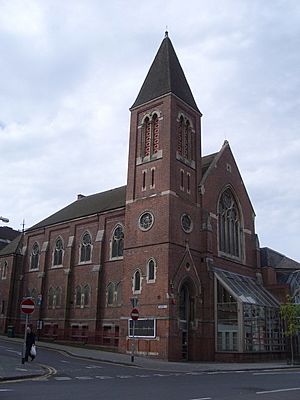Parliament Street Methodist Church facts for kids
Quick facts for kids Parliament Street Methodist Church |
|
|---|---|

Parliament Street Methodist Church
|
|
| 52°57′18″N 1°08′45″W / 52.955025°N 1.145853°W | |
| Country | England |
| Denomination | Methodist |
| Website | lifeatthecentre.com |
| Architecture | |
| Architect(s) | Richard Charles Sutton |
| Groundbreaking | 1874 |
| Completed | 1875 |
| Construction cost | £6,000 |
Parliament Street Methodist Church is a special church located on Parliament Street in Nottingham, England. It is a place where people gather for worship and community activities. This church has a long and interesting history.
Contents
History of the Church
Early Beginnings
The church community started a long time ago. They were part of a group called the Methodist New Connexion. This group formed after some Methodists separated from the main Wesleyans in 1797. Their first meeting place was a chapel in Hockley.
First Building on Parliament Street
The very first church building on this spot opened on April 4, 1817. It was built with brick and plaster. This building could originally seat about 500 people. However, it quickly became too small. So, on February 15, 1826, the church added a gallery. This addition helped increase the seating to 1,000 people.
Building the Current Church
As the community grew, a new, larger church was needed. On August 11, 1874, the first stone for the current church was laid. This important event was led by Alderman W. Foster. The famous architect Richard Charles Sutton designed the new building. Mr. Mayball of Lenton was the contractor who built it. The new church officially opened its doors on May 27, 1875. Later, in 1892, the church was updated by Abraham Harrison Goodall.
Modern Changes and Mergers
In 1989, the church building was refurbished and reorganized. This work was done by Bodill and Sons, with architect G. Birkett overseeing the project. This renovation happened because the Parliament Street congregation joined with the community from the Albert Hall, Nottingham. While the construction was happening, church services were held at St. Catharine's Church, Nottingham.
The Church Organ
About the Organ
The Parliament Street Methodist Church has a large pipe organ. It was made by a company called Conacher and Co. This organ was installed when the church was first built in 1874. It cost about £570 at that time.
Organ Maintenance
The organ needs regular care to keep it sounding great. It was cleaned in 1966. Today, the organ is maintained by Henry Willis & Sons, a company known for its expertise in pipe organs. You can find more details about this specific organ on the National Pipe Organ Register.

